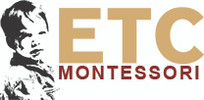
If you are a parent who is considering homeschooling and are interested in finding out more about what Montessori is, we have put together a list of four books to get you started. These books, written by Maria Montessori, will give you a look into the methodology and the reason why we do what we do.
The Montessori Method" lays the foundation for the Montessori approach to education. In this book, Montessori outlines her educational philosophy and methodology, which emphasizes self-directed learning, hands-on experience, and a nurturing environment that respects the individuality of each child. Her approach is grounded in the belief that children learn best in an environment where they can explore, discover, and engage with materials at their own pace.
For homeschooling parents adopting the Montessori Method, this book serves as a vital resource. It provides a comprehensive understanding of the principles and practices of Montessori education, guiding parents in creating an environment that fosters independence, curiosity, and a love for learning in their children. Montessori emphasizes the role of the educator (or parent in a homeschooling context) as a guide who facilitates rather than directs learning, a concept that is particularly relevant for parents who are new to this role.
One of the key aspects of Montessori's philosophy that resonates with homeschooling is the emphasis on learning as a natural, enjoyable process. The book details how to prepare an environment that is conducive to learning, including the selection of age-appropriate materials and activities that are designed to stimulate learning in various developmental areas such as sensory, motor, language, and cognitive skills.
Montessori also discusses the importance of observing children to understand their needs, interests, and developmental stages. This insight is particularly valuable for homeschooling parents, as it enables them to tailor the learning experience to their child's unique abilities and interests, thereby optimizing their educational journey.
Furthermore, "The Montessori Method" explores the development of social skills, emotional growth, and moral education. It provides a framework for homeschooling parents to nurture not just the academic but also the social and emotional well-being of their children, ensuring a holistic approach to education.
"The Discovery of the Child" by Maria Montessori is yet another book that we highly recommend as it takes a deep look into the core principles of the Montessori method, offering insights into child development and the role of education in nurturing a child’s natural desire to learn. This book is particularly relevant for homeschooling parents employing the Montessori approach, as it provides a comprehensive look into creating an environment that encourages independent learning and discovery.
Montessori's book focuses on her observations and theories about how children learn and develop. She emphasizes the importance of a prepared environment, one that is carefully designed to meet the developmental needs of children and encourages exploration and self-directed learning. For homeschool parents, this translates into creating spaces at home where children have access to age-appropriate materials and the freedom to explore these materials at their own pace.
A key takeaway from "The Discovery of the Child" for homeschooling parents is the concept of the absorbent mind. Montessori explains that children, especially in their early years, have an incredible capacity to absorb information from their environment. Understanding this concept helps parents appreciate the significance of their role in providing a rich, stimulating environment that fosters learning and development.
Montessori also delves into specific educational materials and activities that aid in the development of sensory, motor, and cognitive skills. For homeschoolers, this aspect of the book is particularly useful as it guides them in selecting or creating materials that are both educational and engaging, ensuring that learning remains a joyful and fulfilling process for their children.
The book also stresses the importance of observation. For homeschooling parents, observing their children can provide invaluable insights into their interests, learning styles, and developmental stages. This understanding enables parents to tailor educational experiences to their child’s unique needs, enhancing the effectiveness of their homeschooling efforts.
"The Discovery of the Child" extends beyond academic development to address the social and emotional growth of children. Montessori’s insights help homeschooling parents foster not only intellectual but also emotional intelligence and social skills in their children, promoting a well-rounded development.
"The Absorbent Mind" also makes it on our list, as we think it is a profound exploration of early childhood education and development, highlighting the unique ways in which young children learn and absorb information from their surroundings. This book is particularly significant for homeschooling parents who follow the Montessori method, as it provides deep insights into the natural learning process of children and how to nurture it.
In this book, Montessori introduces the concept of the "absorbent mind," referring to the remarkable ability of young children to absorb knowledge effortlessly and unconsciously from their environment. This idea is pivotal for homeschooling parents, as it underscores the importance of creating a rich, stimulating, and supportive learning environment at home. By understanding that children are naturally driven to learn and explore, parents can better facilitate these innate tendencies.
Montessori emphasizes the importance of sensitive periods in child development, which are specific times when children are particularly receptive to learning certain skills and concepts. For homeschooling parents, recognizing and respecting these sensitive periods is crucial for providing appropriate learning experiences that align with their child's developmental stage.
"The Absorbent Mind" also delves into the role of the educator—or the parent in a homeschool setting—in observing and supporting the child's learning journey. Montessori advocates for a guided approach where the adult's role is to prepare the environment and offer support, rather than direct instruction. This approach empowers children to take charge of their learning, fostering independence and self-motivation.
Additionally, Montessori discusses the significance of order, freedom, and discipline in the learning environment. These principles are essential for homeschooling parents to understand as they establish routines and structures that allow their children to explore and learn within a secure and orderly framework.
The book also covers practical aspects of Montessori education, including the use of specific materials and activities designed to engage children in hands-on learning experiences. This is particularly useful for homeschooling parents in selecting or creating materials that cater to their children's learning needs and interests.
"A Child in the Family" is a thoughtful exploration of the dynamics between children and their environment, particularly focusing on the family as the primary context for a child's development. For homeschooling parents, especially those utilizing the Montessori method, this book offers valuable insights into how to create a nurturing and conducive learning atmosphere within the home.
Montessori discusses the importance of understanding the child as an individual with unique needs and characteristics. This perspective is vital for homeschooling parents, as it encourages them to observe and appreciate their child’s individuality, tailoring their educational approach to suit the child’s unique learning style and interests.
The book emphasizes the role of the family in a child's development, highlighting how parents and other family members can create a positive and supportive environment. This is particularly relevant for homeschooling families, as the home serves not only as a living space but also as a learning environment. Montessori suggests practical ways to integrate learning opportunities into everyday home life, making education a natural and enjoyable part of the child’s day.
Montessori also addresses the concept of independence and how parents can foster it in their children. She suggests creating a home environment that allows children to explore and learn at their own pace, which is a cornerstone of the Montessori method. This guidance is invaluable for homeschooling parents looking to develop self-sufficient learners.
Additionally, "A Child in the Family" explores the emotional and psychological development of children. Montessori provides insights into how children perceive and interact with their world, offering advice on how parents can support their emotional well-being. This aspect of the book is crucial for homeschooling parents, as it guides them in addressing the holistic development of their children, beyond just academic learning.

